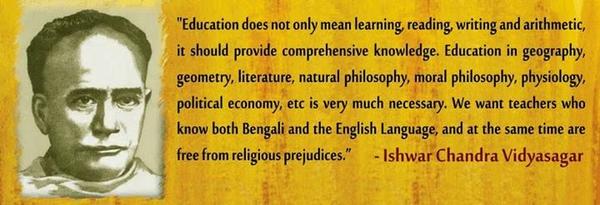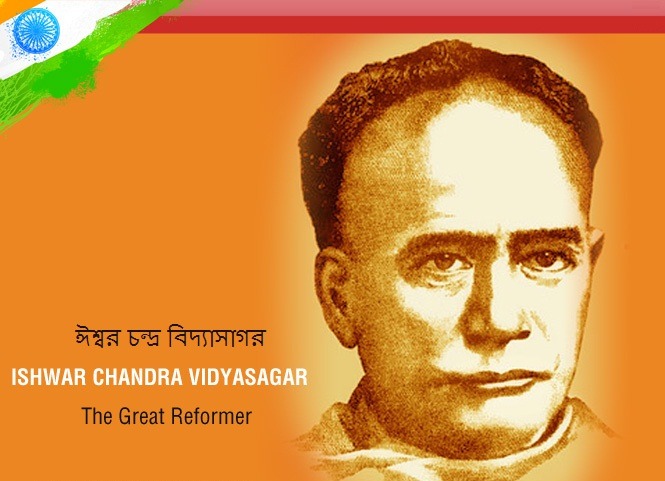The materialistic world of the West looks down on India as a poor nation; this assessment remains empirically valid, no doubt, even at the end of the twentieth century. But a society, nation or country that is ever endowed with great people having such personality, was Ishwar Chandra Vidyasagar. Vidyasagar means an ocean of learning (“vidya” – learning, “sagar” – ocean). He was so humble but lived his complete life with determination and purpose to fulfill certain objectives by contribution towards education and changing the status of women in India was remarkable. He was the great social reformer, writer, educator, and entrepreneur and worked endlessly to transform society. He opened and ran many schools for girls at his own expense. He was also known as “Daya-r Sagar” or “Karunar Sagar” (literally, “ocean of kindness”) because of his charitable nature and generosity.
Ishwar Chandra Vidyasagar was born in an orthodox family on 26th September 1820. Since childhood he was keen to get more and more knowledge. He was born to Thakurdas Bandyopadhyay and Bhagavati Devi in a small village. When he was six years old he was sent to Calcutta to stay with Bhagabat Charan.
He was born to Thakurdas Bandyopadhyay and Bhagavati Devi in a small village. When he was six years old he was sent to Calcutta to stay with Bhagabat Charan. Due to his in-depth knowledge in Sanskrit and philosophy, he received the title “Vidyasagar” from Sanskrit College. While he was the principal of the college, the college became a place of reform. Not only this, Vidyasagar was a great writer and also known as the father of modern Bengali language. Many Bengali alphabets were revised by him. He also wrote a book on grammar rules of Sanskrit that is used till date. Thus he resigned from the Sanskrit College in 1854.

He joined Fort William College (FWC) as a Principal Lecturer in 1841. G.T. Marshall who was the secretary of the college was much impressed by the young man’s dedication and hard work. He worked in the college for five years.
While he was the principal of the college, the college became a place of reform. Not only this, Vidyasagar was a great writer and also known as the father of modern Bengali language. Many Bengali alphabets were revised by him. He also wrote a book on grammar rules of Sanskrit that is used till date. This motivated him to establish schools all over Bengal to spread the light of education. Within two months he arranged for 20 schools to be built. In order to encourage gender equality, he also established 30 schools exclusively for girls.
One of the major factors contributing to the increase in number of child widows was the fact that many wealthy men of high castes used to have numerous wives which they would leave behind as widows upon their death. Thus Vidyasagar also fought against the system of polygamy. He was a very kind hearted person who felt sorry for the sick, poor, and downtrodden. He used to donate money from his salary to the needy regularly. He also nursed sick people back to health, admitted students of so-called lower castes to his college, and cremated unclaimed bodies at the crematorium.
He is best remembered for his relentless efforts in fighting the injustices meted out to women, especially widows. Moved by the plight of child widows, he persuaded the British Government to take action and pushed for it to pass The Hindu Widows’ Remarriage Act, 1856.
In 1834 when he was 14 years old he married Dinamani Devi. The couple had one son, Narayan Chandra. He was very unhappy with his family due to their narrow-mindedness and went to live with the Santhals at ‘Nandan Kanan’ in the district of Jamtara where he spent the last two decades of his life. During his later years his health deteriorated and he died in 1891.
Ishwar Chandra Vidyasagar passed away at the age of 70 on 29 July, 1891. After his death, Ishwar Chandra Vidyasagar’s home was sold by his son to the Mallick family of Kolkata that was later purchased by the Bengali Association, Bihar on 29 March 1974. They maintained the house in its original form and also started the girl’s school and a free homeopathic clinic. Ishwar Chandra Vidyasagar truly brought reforms in the education system of Bengal by removing the pervading darkness.
Ishwar Chandra Vidyasagar was indeed a great personality and a reformer. Today, India needs such dedicated, humble and determined personalities who can bring all sorts of required reforms by working solely for the betterment of the society than their own interest.















